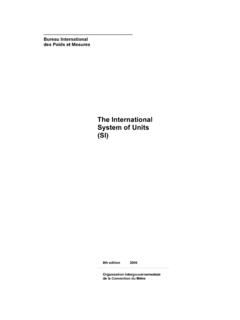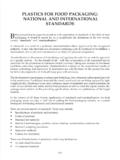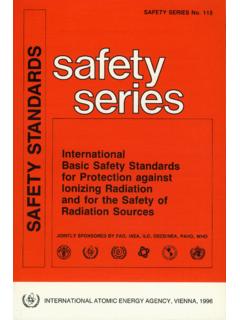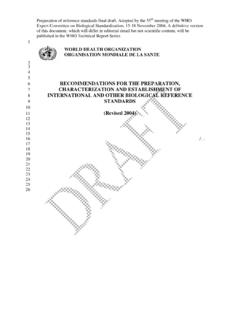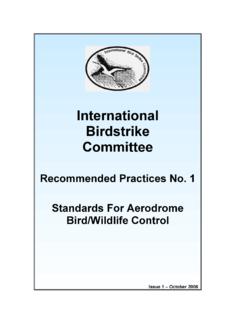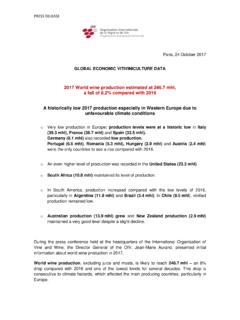Transcription of October 2000 International Trade and Core Labour …
1 Policy BriefOrganisation for Economic Co-operation and Development OECD 2000 October 2000 IntroductionIn 1996, the OECD published a pioneering study entitled Tr a d e , E m p l o y m e n tand Labour standards : A Study of Core Workers Rights and International Tradewhich was instrumental in helping foster a high degree of International polit-ical consensus about the definition of a limited set of core Labour the 1996 OECD study, there have been wide-ranging developments, atthe national and International levels, bearing on the question of Trade ,employment and core Labour Policy Brief draws on a new OECD study, published under the title Inter-national Trade and Core Labour standards , which analyses these shows that the major findings of the 1996 study remain largely valid. At thesame time, certain aspects of the complex interplay between Trade , employ-ment and core Labour standards continue to attract differing views, includingamong OECD Member countries.
2 The new publication aims to widen the areaof common ground on one of the most sensitive issues of the ongoing policydialogue about globalisation and the intensification of International Trade has occurred at the ILO in recent years?June 1998 saw the adoption of the ILO Declaration on Fundamental Princi-ples and Rights at Work, which succinctly stated four principles and rights,committed the ILO s member states to respect them and stressed that labourstandards are not to be used for protectionist Trade purposes. According to theILO Declaration, these principles and rights include: a) freedom of associationand the effective recognition of the right to collective bargaining; b) the elim-ination of all forms of forced or compulsory Labour ; c) the effective abolitionof child Labour ; and d) the elimination of discrimination in respect of employ-ment and recalling the importance of the corresponding ILO conventions (knownas fundamental conventions), the ILO Declaration extended the range ofreporting on the application of the fundamental principles and rights toinclude countries that have not ratified these conventions.
3 In June 1999, theILO members adopted a new fundamental convention (No. 182) banning theworst forms of child Labour . With its entry into force scheduled forNovember 2000, it is set to become the eighth fundamental convention. Sincethe 1996 OECD study, the number of countries that have ratified all of theseven original fundamental conventions has more than doubled. In addition,the new fundamental convention on the worst forms of child Labour has expe-rienced a rapid pace of ratification. Although the country coverage of ratifica-tions is extensive, follow-up is still required to improve monitoring and toinclude non-ratifying has occurredat the ILO in recentyears?..and at the WTO?What aboutdevelopments at theregional andnational level, and ininternationalorganisations?What is the situationconcerning export-processing zonesand foreign directinvestment?Has recent researchshed new light onthe subject?Summing upFor further readingWhere to contact usInternational Trade and Core Labour Standards2 Policy BriefInternational Trade and Core Labour StandardsMoreover, there remains a continu-ing gap between the internationalrecognition of core Labour standardsand their application.
4 Based on pub-lished observations of the ILO Com-mittee of Experts on the Applicationof Conventions and Recommenda-tions, the OECD study finds no indi-cation in recent years of substantialprogress overall in reducing non-compliance with respect to freedomof association and the right to collec-tive bargaining among a broad sam-ple of 69 countries that have ratifiedthe two corresponding ILO funda-mental 1998 ILO Declaration estab-lished a follow-up mechanism topromote the fundamental principlesand rights at work, including a spe-cial annual report designed to pro-vide a dynamic global picture of thesituation and facilitate the assess-ment and prioritisation of ILO tech-nical co-operation this mechanism and otherinitiatives, the ILO is giving renewedimpetus to its already substantialtechnical co-operation efforts. Whileit will take time before the full effectsof these changes are felt, it appearsthat some countries are respondingto the increased International scru-tiny and assistance.
5 A future chal-lenge will be to focus internationalattention on the most serious short-comings in a way that leads to earlyimprovements, while maintainingefforts to promote increased respectfor Labour standards in the law andpractice of Member countries at the WTO?At Singapore in December 1996,WTO members renewed theircommitment to the observance ofinternationally recognised corelabour standards , supported collabo-ration between the WTO and ILOS ecretariats, rejected the use oflabour standards for protectionistpurposes and recognised that the ILOis the competent body to set and dealwith core Labour standards . At theThird WTO Ministerial meeting atSeattle, in December 1999, the USproposed establishing a WTO Work-ing Group on Trade and Labour . TheEU favoured a joint ILO/WTO Stand-ing Working Forum on the issue, andCanada suggested a WTO WorkingGroup on the relationships betweenappropriate Trade , developmental,social and environmental policychoices in the context of adjusting toglobalisation.
6 These proposals wereopposed by a number of WTO Mem-bers. Given that no Ministerial Decla-ration was concluded, the future ofproposals to set up working groupsappears about developments at the regional and national level, and in International organisations?Efforts have continued within theNorth American Agreement onLabor Cooperation to resolve labourlaw issues by promoting enforce-ment of existing Labour laws in thethree Member countries. Tworegional economic integration agree-ments Mercosur and SADC(Southern African DevelopmentCommunity) have both recentlyadvanced towards adoption of socialcharters endorsing a series of labourprinciples and providing for moni-toring of the US Generalised System of[tariff] Preferences (GSP) scheme,benefits were suspended in a caseinvolving bonded child Labour andfailure to allow for freedom of asso-ciation. And country practice reviewsare used to obtain improvements inworker rights in certain the European Community GSPscheme, the main focus is the provi-sion of additional Trade preferences tocountries that can demonstrate theircompliance with certain core labourstandards.
7 The EC GSP scheme alsoallows for temporary suspension ofpreferences, to be decided under cer-tain US has passed legislation pro-hibiting the manufacture or importof goods produced by forced orindentured child Labour . The US hasnegotiated a statement of co-opera-tion with a major exporter of Labour -intensive goods allowing USembassy officials to visit prisons sus-pected of operating factories withgoods for export. Commitments tocore Labour standards were alsoincluded in a partnership agreementbetween the European Communityand the Africa, Caribbean andPacific States (ACP) and a Trade ,development and co-operationagreement between the EuropeanCommunity and South contribution of development co-operation programmes to eradicatingexploitative forms of child labourhas become more focused and result-oriented. The OECD DevelopmentAssistance Committee (DAC) Strat-egy of 1996, Shaping the21st century: The Contribution ofDevelopment Co-operation com-mits donors to assist partners inachieving universal access to primaryeducation in all countries by Labour standards and their oper-ational implications have taken onheightened importance for the WorldBank, within its mandate on povertyreduction and economic and socialdevelopment, and for many otherinternational financial are also continuing to har-ness International investment andmultinational enterprises to pro-mote core Labour standards world-wide.
8 For example, a comprehensivereview of the OECD Guidelines forMultinational Enterprises was com-pleted in June 2000. The Reviewaimed to ensure the continued rele-vance and effectiveness of the3 Policy BriefInternational Trade and Core Labour StandardsGuidelines. It added recommenda-tions in relation to those core labourstandards that were missing from theearlier text (child Labour and forcedlabour, in particular). The revisedrecommendations make it clear thatthey apply to enterprises operatingin or from adhering countries andthat they are relevant for their oper-ations in all countries. The Guide-lines are part of a broad and balancedpackage of instruments, under theOECD Declaration on InternationalInvestment and Multinational Enter-prises, designed to further interna-tional co-operation in the field ofinternational investment and multi-national codes of conduct writtenexpressions of commitment to agiven standard of business conduct have continued to grow in example, in the US, most Fortune500 companies have adopted codes ofconduct or internal guidelines, deal-ing with a variety of matters, includ-ing core Labour standards .
9 In the UK,over 60% of the top 500 companieshave similar codes; a decade ago thefigure was only 18%. The social part-ners from the textiles and clothing,footwear and commerce sectors in theEU have negotiated codes of conductbased on core Labour is the situation concerning export-processing zones and foreign direct investment?There are several hundred export-processing zones (EPZs) operatingin China. Outside China, EPZs havegrown from some 500 at the time ofthe 1996 study to about 850,employing 27 million people. Insome countries national Labour leg-islation does not apply to EPZs. Andthe ILO concludes that problematicfactors such as high Labour turnover,absenteeism, stress and fatigue, lowrates of productivity, excessive wast-age of materials and Labour unrestare still too common in some the same time, wages in EPZstend to be higher than average wagesin the rest of the International competitionis changing the priorities for foreigninvestors who tend to favour invest-ment locations with highly skilledworkers and modern infrastructure.
10 Smart EPZs have adopted strate-gies to ensure that Labour productiv-ity is continuously upgraded. Morebroadly, recent FDI data confirm thatMNEs invest principally in the larg-est, richest and most dynamic mar-kets. With the notable exception ofChina, countries where core labourstandards are not respected continueto receive a very small share of globalinvestment flows. There is no robustevidence that low-standard coun-tries provide a haven for foreignfirms seeking to gain a competitiveadvantage by this recent research shed new light on the subject?A search of relevant literature in thepublic domain, since the 1996 studywas completed, allows a number oftentative conclusions to be which strengthen theircore Labour standards can increaseeconomic growth and efficiency byraising skill levels in the work forceand by creating an environmentwhich encourages innovation andhigher productivity. Some recentstudies consider the links betweentrade, democracy and wages.










